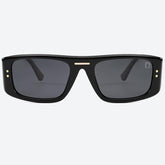Matrix Neo Sunglasses: What Sunglasses Keanu Reeves Wears
“Red pill or blue pill?”
I know most people know Matrix, it’s a super cool movie. It is no exaggeration to say that The Matrix is one of the most important science fiction movies in the past 20 years.
About The Matrix
Nowadays everything is generated by AI. AI-generated text, AI-generated pictures, even AI-generated videos, admit it, you have a moment of fantasy: “Are we living in an AI-generated world?” Is this world even real? Lana and Lilly Wachowski, the directors of The Matrix, have been pondering this question for at least 20 years.
In the movie, AI enslaves all human beings. They lock humans in petri dishes, use them as endless power generation materials, and manage the world through a large group of squid-like robots.
Some people say that The Matrix is inspired by the famous paradox “The Brain in a Vat”; others say that The Matrix is inspired by Blade Runner and Ghost in the Shell (Oshii Mamoru’s version). I admit that this is interesting, but it is not the focus of our discussion here.
The main point this time – I want to talk about Neo’s sunglasses in The Matrix.
Neo’s Sunglasses
Neo, “The One” , Keanu Reeves in 1999. I know, I know, this sounds really cool, you know what would make this look even cooler? That means asking him to put on sunglasses. As far as I know the Keanu Reeves sunglasses in The Matrix were actually custom built by a designer from the eyewear company Blinde.
It was a pair of rimless oval sunglasses, and the slightly upturned lenses made Neo look more aggressive.
Why Do Neo Wear Sunglasses In The Matrix?
Coolness and Style
The sunglasses contribute to Neo’s overall “cool” and enigmatic persona. Wearing sunglasses indoors or in situations where they aren’t traditionally necessary has been a longstanding fashion choice in films, and it often suggests a sense of confidence and control.
Symbolism
In the context of “The Matrix,” the sunglasses can be seen as a symbol of Neo’s awareness and defiance against the simulated reality. Characters who have “awakened” to the truth of the Matrix, like Neo and Morpheus, often wear sunglasses as a way to shield their eyes from the artificial light of the simulated world(Symbolical).

What Is The Symbolism Of Sunglasses In The Matrix
In The Matrix, sunglasses take on symbolic meaning as a visual motif that reflects themes of consciousness, rebellion, and the difference between reality and fantasy. Here are some key aspects of the symbolism of sunglasses in the film:
Perception of reality: The characters in The Matrix who “awaken” to simulate the truth of reality wear sunglasses. This includes characters like Neo and Morpheus. Sunglasses symbolize their higher perception and awareness. By protecting their eyes, they metaphorically protect themselves from the false reality presented by The Matrix.
Defiance and rebellion: Wearing sunglasses indoors or in situations where they are not usually required is often associated with a rebellious or anti-establishment attitude. In The Matrix, the character wearing sunglasses is part of the resistance machine. The sunglasses became a visual marker of their resistance to Matrix control.
Hiding the Eyes:Eyes are often considered the windows to the soul, and hiding them can create a mysterious or mystical appearance. In the context of The Matrix, characters aware of simulated reality may choose to hide their eyes as a way to distance themselves from the illusion. It adds an element of mystery to their characters, emphasizing that they see something beyond the surface.
Differentiating the World:The act of wearing sunglasses becomes a way to differentiate between the artificial world of The Matrix and the real world. When characters like Neo transition from one realm to another, they often put on or take off their sunglasses. This visual cue reinforces the idea of dual existence and the constant shift between simulation and reality.
Cool and Stylish: In addition to symbolism, sunglasses are also used for fashion reasons. The stylish look of characters like Neo, who wears sunglasses, contributes to the overall aesthetic of the film. It enhances their cool and iconic look, making them stand out in the visually dynamic world of The Matrix.
To sum up, the symbolism of sunglasses in The Matrix is multifaceted, covering themes of perception, rebellion, consciousness, and the duality between reality and fiction. The visual language of the sunglasses adds depth to the characters and reinforces the philosophical and existential themes explored in the film.

Before we delve deeper into movies and philosophy, we must recommend a pair of equally cool and stylish sunglasses: Dollger Metal Square Frame Sunglasses. Although this pair of glasses does not look like it will make you become The One like Neo. But this pair of glasses is also the same Defiance and rebellion, and the metal frame is very Y2K. I think if you like The Matrix, you will definitely like it.
Existential Themes In The Matrix
“The Matrix” is rich with existential themes that delve into questions of reality, individuality, free will, and the nature of existence. Here are some key existential themes explored in the film:
Illusion vs. Reality:The central theme revolves around the stark contrast between the illusionary world of the Matrix and the harsh reality of the post-apocalyptic Earth. Characters must confront the question of what is real and grapple with the deceptive nature of their perceived existence.
Authenticity and Identity: Characters in the film, particularly Neo, struggle with questions of identity and authenticity. Neo’s journey involves questioning his purpose, his role as “The One,” and whether he has the agency to define himself in a world where his reality has been manipulated.
Choice and Free Will: The concept of choice and free will is integral to existential philosophy. The characters face critical choices, notably Neo’s decision to take the red pill and confront the truth about the Matrix. The film explores the idea that true freedom comes from making informed choices, even if those choices are challenging.
The Absurdity of Existence:Existentialism often grapples with the absurdity of human existence. In “The Matrix,” the revelation of the simulated reality challenges the characters’ understanding of their world, leading them to confront the absurdity of their existence and the realization that their lives have been controlled by external forces.
Search for Meaning:Neo’s journey mirrors an existential quest for meaning. As he becomes aware of the Matrix and his role in the conflict between humans and machines, he seeks purpose and meaning in a world that has been fundamentally altered. The film suggests that individuals must actively create their own meaning and purpose.
Individual Responsibility: Existential philosophy emphasizes individual responsibility for one’s choices and actions. In “The Matrix,” characters like Neo and Morpheus take on significant responsibilities in the fight against the machines. The burden of choice and responsibility becomes a central aspect of their existential journey.
Transcendence and Liberation:Neo’s transformation into “The One” symbolizes a form of existential transcendence. He moves beyond the limitations of the Matrix, challenging the predetermined rules and achieving a state of liberation. This theme aligns with existential notions of transcending the constraints imposed by external forces.
Isolation and Alienation:Existentialism often explores feelings of isolation and alienation. Characters who have awakened to the truth of the Matrix may feel isolated from those still trapped in the illusion, highlighting the existential loneliness that comes with knowledge.
“The Matrix” uses these existential themes to create a narrative that goes beyond traditional action science fiction. It invites viewers to reflect on fundamental questions about reality, choice, and the nature of human existence, making it a thought-provoking and philosophically rich film.
Conclusion
The French magazine “New Observer” said that the “Matrix” series suddenly awakened people’s enthusiasm for philosophical interpretation that had been accumulated for more than ten years. Plato, Kant, Nietzsche, transcendentalism, the Frankfurt School and postmodern theory were all rushed to this In the bustling market. Ideas are put on different stalls by people with different tastes for “matrix” fans to get what they want. Faced with this dazzling philosophical “matrix”, Plato and Kant might be quite interested in watching their thoughts being possessed by Hollywood in a cool guy wearing sunglasses who needs “guns, lots and lots of guns.” Teenagers can get an introduction to philosophy.





